


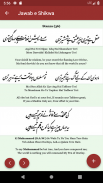
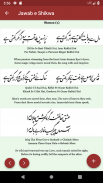
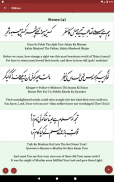
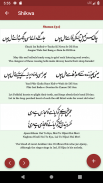
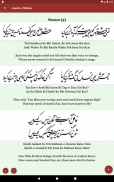
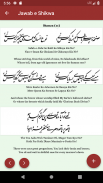

Shikwa Jawab e Shikwa
With English Translation

คำอธิบายของShikwa Jawab e Shikwa: With English Translation
Shikwa (Urdu: شکوہ) and Jawab-e-Shikwa (Urdu: جواب شکوہ) are poems written by well known Urdu language poet Muhammad Iqbal, which were later published in his book Kulliat-e-Iqbal. "Shikwa" is an Urdu word which translates to "complaint" in English.
Shikwa (1909) and Jawab-i-Shikwa (1913) extol the legacy of Islam and its civilising role in history, bemoan the fate of Muslims everywhere, and squarely confront the dilemmas of Islam in modern times. Shikwa is thus, in the form of a complaint to Allah for having let down the Muslims and Jawab-i-Shikwa is Allah's reply.
When the first part of these poems, Shikwa (1909), was published it created a big confusion amongst Muslim scholars who thought that Iqbal is being rude and harsh in his words when talking to God in his book and being unthankfull of the blessings of God since the second part of his poem (Jawab-e-Shikwa) was not announced with Publication of the first one. But later when Jawab-e-Shikwa (1913) was published all the problems went away and everyone praised Iqbal for his contribution to Urdu Poetry and making a difference in Islamic literature.
Shikwa (อูรดู: شکوہ) และ Jawab-e-Shikwa (อูรดู: جوابشکوہ) เป็นบทกวีที่เขียนโดยที่รู้จักกันดีกวีภาษาอูรดูมูฮัมหมัดอิคบาลซึ่งได้รับการตีพิมพ์ในภายหลังในหนังสือของเขาที่ Kulliat-e-อิคบาล "Shikwa" เป็นคำภาษาอูรดูซึ่งแปลว่า "การร้องเรียน" ในภาษาอังกฤษ
Shikwa (1909) และ Jawab-i-Shikwa (1913) ยกย่องมรดกของศาสนาอิสลามและบทบาทเสริมในประวัติศาสตร์จงเสียใจด้วยชะตากรรมของชาวมุสลิมทุกที่และตรงเผชิญหน้าวิกฤติของศาสนาอิสลามในยุคปัจจุบัน Shikwa จึงเป็นในรูปแบบของการร้องเรียนไปยังอัลเลาะห์สำหรับการให้ลงมุสลิมและ Jawab-i-Shikwa ตอบเป็นอัลเลาะห์
เมื่อส่วนแรกของบทกวีเหล่านี้ Shikwa (1909) ได้รับการตีพิมพ์มันสร้างความสับสนในหมู่นักวิชาการที่ยิ่งใหญ่ของชาวมุสลิมที่คิดว่าอิคบาลจะถูกหยาบและรุนแรงในคำพูดของเขาเมื่อพูดคุยกับพระเจ้าในหนังสือของเขาและเป็น unthankfull พรของพระเจ้า ตั้งแต่ส่วนที่สองของบทกวีของเขา (Jawab-e-Shikwa) ไม่ได้ประกาศที่มีการตีพิมพ์ครั้งแรก แต่ต่อมาเมื่อ Jawab-e-Shikwa (1913) ได้รับการตีพิมพ์ปัญหาทั้งหมดกลับออกไปและทุกคนยกย่องอิคบาลในการมีส่วนร่วมของบทกวีภาษาอูรดูและสร้างความแตกต่างในวรรณกรรมอิสลาม
























